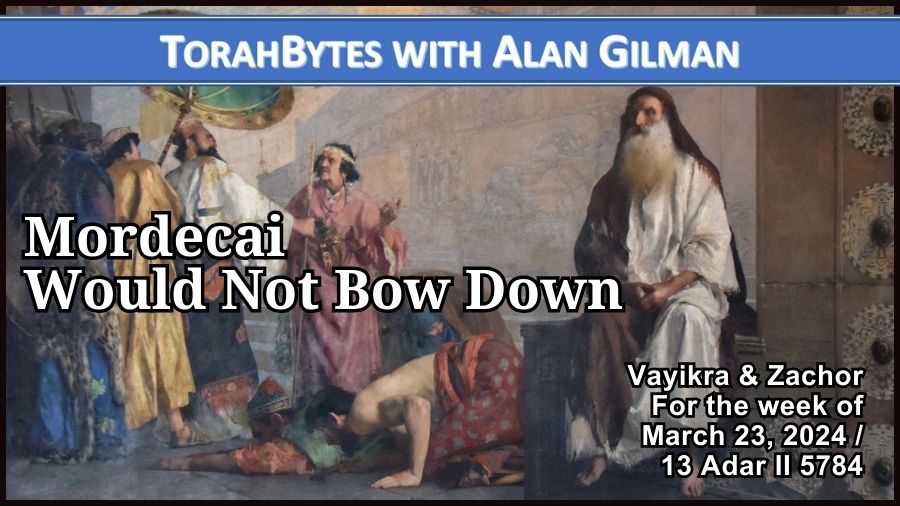For the week of March 23, 2024 / 13 Adar II 5784

Vayikra & Zachor
Vayikra/Leviticus 1:1 – 5:26 (English 1 – 6:7); D’varim/Deuteronomy 25:17-19
Haftarah: 1 Samuel 15:2-34
And when Haman saw that Mordecai did not bow down or pay homage to him, Haman was filled with fury. But he disdained to lay hands on Mordecai alone. So, as they had made known to him the people of Mordecai, Haman sought to destroy all the Jews, the people of Mordecai, throughout the whole kingdom of Ahasuerus. (Esther 3:5-6)
The Festival of Purim begins this year on the evening of March 23. The title of this week’s message is a fitting summary of the meaning of Purim. I borrowed it from the book of the same name by Dr. Timothy P. Jackson, currently Professor Emeritus of Theological Ethics at the Chandler School of Theology, Emory University in Atlanta, Georgia. Jackson’s book is not about Purim per se, but an analysis of the dynamics of antisemitism. Yet, a central element of the Purim story, the extreme reaction to Mordecai’s unwillingness to bow down to Haman, is according to Jackson—and I agree with him—the essence of what antisemitism is all about.
When people attempt to identify the earliest forms of antisemitism, they might look at the conflicts between Isaac and Ishmael or Jacob and Esau, but these in no way typify the venomous Jew hatred of the later Christian era, when the Jews, as a people, were ascribed the most negative of traits, including that of being God’s enemies. Other conflicts such as Israel’s oppression under Pharaoh as slaves in Egypt or their devastation and exile under the empires of Assyria and Babylon were far more like normal nation-building of megalomaniac kings. Antisemitism targets Jews for being Jews with little conscious ideological or political motivations.
The events of Purim may, in fact, be the prototype of antisemitism. After the Persian king promoted Haman, Mordecai, who was Jewish, was the only one who would not bow down before him. The reason was likely that Haman was an Agagite, descended from the Amalekites, ancient enemies of Israel. That Haman was enraged is not surprising; it’s what his rage led him to do that was a new kind of evil. Haman went to the king and said:
There is a certain people scattered abroad and dispersed among the peoples in all the provinces of your kingdom. Their laws are different from those of every other people, and they do not keep the king’s laws, so that it is not to the king’s profit to tolerate them (Esther 3:8).
What motivated Haman’s murderous rage against all Jews was Mordecai’s literal stand against showing deference to him, but that’s not what he told the king. His annihilation plan was forged by depicting the Jewish people as different, a difference that should not be tolerated. The King was quick to comply. We read:
Letters were sent by couriers to all the king’s provinces with instruction to destroy, to kill, and to annihilate all Jews, young and old, women and children, in one day, the thirteenth day of the twelfth month, which is the month of Adar, and to plunder their goods (Esther 3:13).
The one Jewish man Mordecai’s unwillingness to bow unleashed a murderous onslaught on his whole people, justified by their being different and the false claim of disobeying the King’s laws. They weren’t actually disobeying the law, only Mordecai did. One law against one man, Haman. Yet, note how easy it was for the political machine and the entirety of society to be taken up with Haman’s offense.
Jackson explains that people who study antisemitism can’t seem to find any reasonable motivations behind it. The more it is studied, the less sense it makes. Most evil behavior has some justification no matter how misguided, while antisemitism appears to be simply insane. Jackson disagrees. He claims that antisemitism is driven by a rejection of “moral monotheism.” If I understand him correctly moral monotheism asserts that there is only one God who imposes his clear moral and just guidelines upon all. This makes all individuals ultimately answerable to God not human authority. Understanding this, Mordecai was able to stand against one of the most powerful empires of all time, something that anti-God powers, both seen and unseen, will not tolerate.
Mordecai symbolizes the special role to which God has called the Jewish people (and all who trust in the Jewish Messiah). Whether we are aware of it or not, we find ourselves at odds with the prevailing ungodly powers as they oppose the God of Israel and all he stands for. In the end, however, as demonstrated by the story of Purim, God always prevails. We are well advised to follow Mordecai’s example.
All scriptures, English Standard Version (ESV) of the Bible
Thanks, Alan, for your faithful blogging in season and out of season, especially here as Purim approaches.
Very timely.